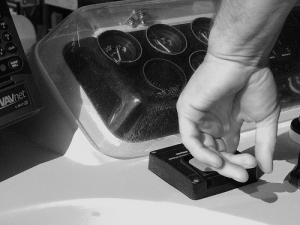Warning: I asked a trusted colleague to review this blog before I posted it. He said he was “creeped out by it and got the heebie jeebies” before getting to my main point. I acknowledge that you may find it a bit over the top compared to my other messages, but please understand that I’m trying to emphasize the importance of considering EVERY person’s feelings and caring about ALL people, even if we don’t know them or like them.
__________________
Not that I want to contradict Dan Hill’s “We Always Hurt the One we Love” lyrics, but I know—and so do you—from personal experience that it’s so much easier to hurt a stranger. By “easier,” I mean it hurts me less to hurt a stranger than it does to hurt someone I love.
You may remember the famous Milgram experiment that involved inflicting pain on strangers. In the shadow of the Holocaust, Yale assistant professor of psychology Stanley Milgram conducted his study on obedience to authority. The world wondered (and we still do) how the Nazis were able to persuade so many ordinary Germans to participate in the murder of innocent people.
Milgram’s experiment in 1963 (http://www.simplypsychology.org/milgram.html)
showed that average people were willing to administer a lot of pain to innocent strangers if an authority figure instructed them to. Participants were told they were participating in a study of the effect of punishment on learning. A “learner” was strapped in a chair in an adjacent room, with electrodes attached to his/her arm. The participant was told to read test questions, and to administer a shock whenever the learner gave the wrong answer.
Thankfully, the shocks weren’t real. But the participants were told they were and were instructed to increase the voltage with every wrong answer. At 150 volts, the participant could hear the learner cry in protest, complain of heart pain, and ask for the study to stop. After 330 volts, the learner made no noise at all. Through the experiment, the scientist in the room repeatedly told the participant to ignore the protests.
More than 80% of the participants continued after administering the 150-volt shock, and 65% went all the way up to 450 volts.
Milgram’s experiment has been replicated often in recent years, with similar results. The experimental design makes me cringe; the results make me sad.
I realize this was a study about obedience to authority. But, looking at it through my affinity-building lens, I can’t help but see it as a statement about how easy it is to hurt those with whom we don’t feel attached. Would the experiment results have been different if the “learners” were friends or acquaintances of the participants? I think so . . . I HOPE so.
Can you imagine sitting in one room with the “shocker” button and having to administer 450 volts to your friend, family member, or co-worker in the next room? (Please refrain from fantasizing about shocking some of your co-workers). Most of us couldn’t/wouldn’t continue with the experiment if we knew we were inflicting major pain or even discomfort on someone about whom we cared.
So What?
So, does that mean the person in the next room is more worthy of being jolted if we don’t know him or her? I hope not.
What it means is that we need to treat the “people in the next room” as if we DO care about them . . . or, better yet, we need to simply CARE ABOUT EVERYBODY.
And, as you know if you’ve participated in any of my training about affinity building, it’s much easier to care about someone if you have an affinity with them. If you can’t find a connection with a stranger, MAKE one.
You may not be asked to give anyone an electrical shock in the coming weeks. But, maybe you’ll need to deliver some bad news. Maybe you’ll need to discipline a team member or a neighborhood kid who litters on your lawn. Or, maybe you’ll feel the desire to “even the score” with someone. When faced with a decision that may inflict pain (physical or emotional, severe or minor) on someone you don’t know very well, picture that person as your friend, someone you love and care about. If you truly feel the pain is necessary and beneficial, then go ahead. If not, step back—no matter who is instructing you.
Building Affinity,
Betsy


